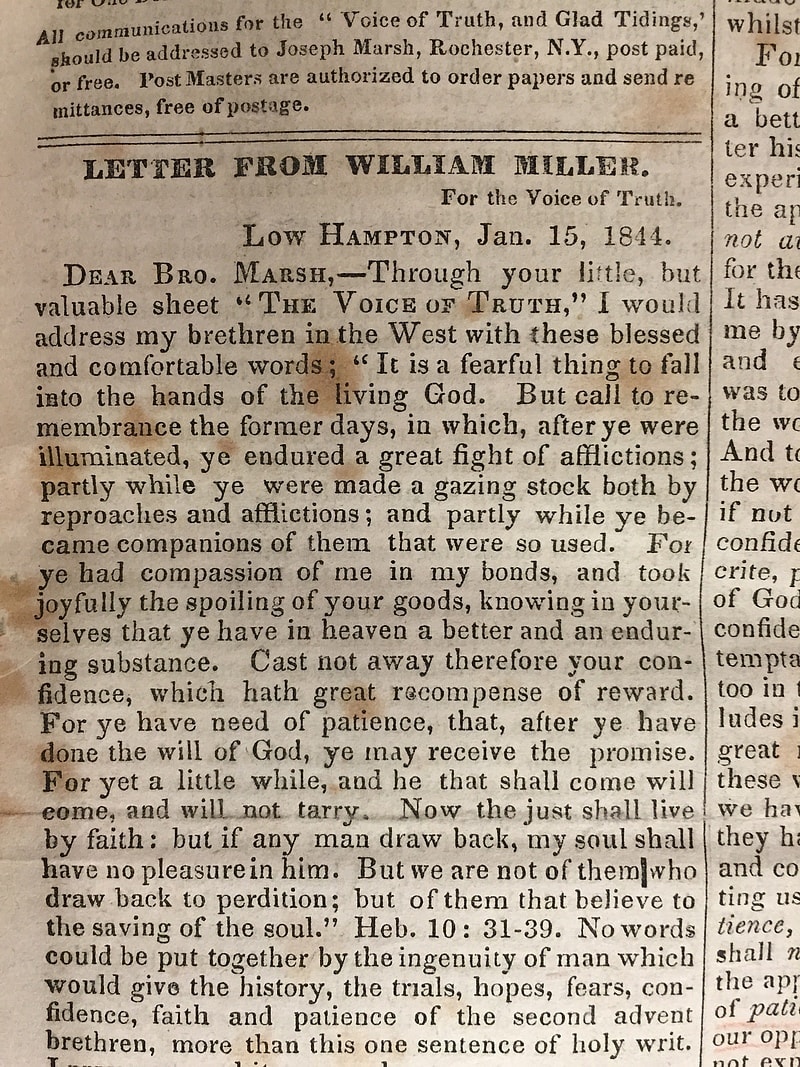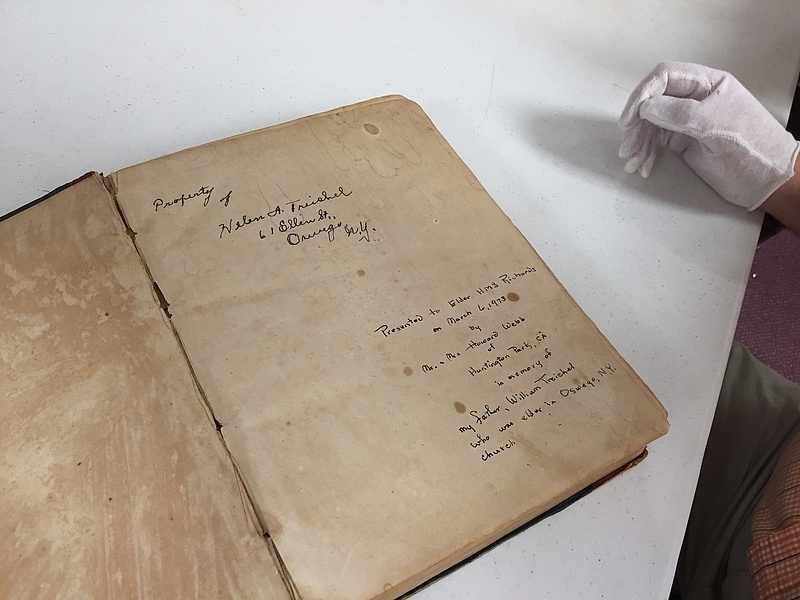
, LSU
When La Sierra University archivist Tony Zbaraschuk first looked inside the large, gray-green book with a worn cover and yellowed pages, he couldn’t quite believe what he saw.
The hardcover volume, which he originally thought might be an old accounting ledger, contained nearly three years of weekly newsletters called The Voice of Truth published in Rochester, New York, between October 1844 and June 1847.
But it was the date on the first newsletter, Oct. 10, 1844, that captured his attention.

“I looked at it and my jaw dropped,” said Zbaraschuk. “A date early in October 1844? Wow.”
The newsletters are part of a 10,000-volume collection at the H.M.S. Richards Library, which was officially opened to historians, pastors, students, and other researchers during a dedication ceremony for La Sierra University’s H.M.S. Richards Divinity School. The library is open Mondays, from 1 p.m. to 7 p.m. for onsite study. The historic newsletter volume, which Zbaraschuk carefully handled while wearing white cotton archivist’s gloves, is now available for other researchers to peruse, once they don the gloves.
The volume contains letters and editorials that served as the primary means of communication for the Christian movement led by Baptist preacher William Miller. The evangelist, along with Samuel Snow and others, predicted the soon return, or advent, of Jesus Christ on specific days based on their interpretation of prophecy in the book of Daniel and Judaic calendars.
The first newsletter in the aged book that Zbaraschuk opened was published just 12 days prior to the most significant of these predicted dates, Oct. 22, 1844. On this day, about 100,000 Christians waited with great hope and expectation for the return of Jesus and the establishment of his kingdom on Earth. Many disposed of all their possessions in preparation.
One notice re-published in The Voice of Truth during the days leading up to the anticipated advent reads: “I.T. Hough, tailor and draper, Fifth Street, below Market, Philadelphia. Has closed his store, and placed the following inscription on his shutters: ‘This Shop is closed in honor of the King of Kings, who will appear about the 23rd of October. Get ready, friends to crown him Lord of all.’”
Oct. 22 became known as the Great Disappointment. While many discouraged people left the movement, others eventually branched out and formed their own groups, including the Seventh-day Adventist Church, which officially formed in 1863. The biblical prophecies were studied anew and many realized the events depicted in the book of Daniel described the start of Jesus’ work of atonement for humanity’s sins rather than of Christ’s return to Earth on a specific day.
Voice of Truth editor and publisher Joseph Marsh in a Nov. 7, 1844 issue wrote: “We have been mistaken in a belief to which we thought ourselves conducted by the word and Spirit, and Providence of God. … We have an unwavering trust that He will cause our disappointment and trial to work together for our good.”

The La Sierra University library is part of the divinity school named after Richards, a Seventh-day Adventist pioneer radio evangelist and founder of the international religious radio program Voice of Prophecy. During the early 2000s, the Richards family contributed the family patriarch’s 10,000-volume personal library along with hundreds of letters, sermon and broadcast scripts and photos to La Sierra University, the alma mater of the four Richards children. Zbaraschuk and library volunteer Connie Lorenz have been sorting, cataloging, and scanning the library’s contents.
Richards began his sermon broadcasts on KNX-AM radio in Los Angeles in 1929. By 1942 the program had become one of the first religious radio shows to air nationwide. By 1980, the Voice of Prophecy operated on a $6 million budget and was aired on 700 stations around the world. The program eventually aired on more than 1,000 stations in dozens of languages, and offered Bible courses in some 80 languages through more than 125 correspondence schools. It operates today out of its studio and offices in Loveland, Colorado.
Richards, a voracious reader, collected books from various bookstores and dealers on topics that spanned many subjects. He strongly advised pastors to broaden their reading repertoire. He was such an avid reader himself he was known to arrange a driver to transport him to speaking engagements and broadcasts so that he could bring stacks of books and read in the back of the car as he traveled. He frequently lent books to others from his substantial collection.
Also stored in the library are hundreds of Richards’ hand-written sermon notes and his letters exchanged with denominational leadership as well as with other high-profile evangelists of the day, including Billy Graham.
The Voice of Truth newsletter volume was discovered in early summer 2014, in a storage unit in Riverside where the Richards family stacked boxes of books and belongings removed from their renowned forebear’s home in Glendale. The Voice of Truth newsletters had been given as a gift to Richards in 1973 by “Mr. and Mrs. Howard Webb of Huntington Park in memory of my father, William Treichel who was elder in the Oswego New York Church,” a hand-written inscription on a title page states.
The 19th-century letters submitted to The Voice of Truth by residents of New York, Pennsylvania, Connecticut, and other northeastern enclaves also open a window into the lifestyle and culture of the day.
“It was how people would communicate, especially if they were too poor to travel,” or had to attend a family farm or business, Zbaraschuk said. “People were trying to understand what happened, and this is how they carried out their discussions.”
Of all the historic artifacts in the Richards library, the newsletter volume is among the most significant because of its insights into the very roots of Seventh-day Adventist history, he said.
“This is a physical connection to our pioneers,” Zbaraschuk said. “It gives a sense of connection one does not get from a reprint. There may be things here we haven’t previously known about the Adventist movement.”